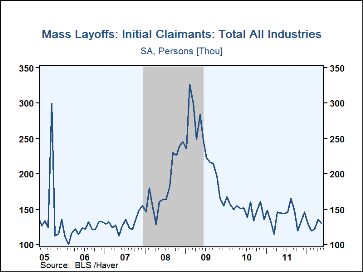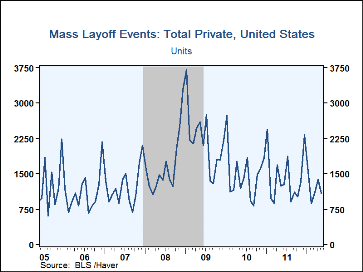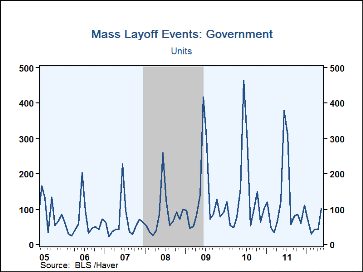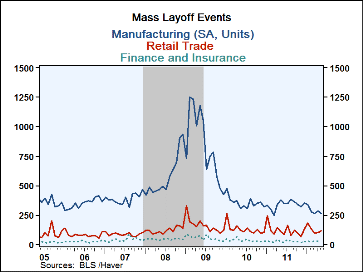 Global| Jun 20 2012
Global| Jun 20 2012U.S. Mass Layoffs Trend Lower
by:Tom Moeller
|in:Economy in Brief
Summary
Mass layoffs in the U.S. during May fell slightly following a sharp April increase. The Labor Department reported this morning that layoffs of 50 or more persons from a single firm slipped a seasonally adjusted 0.6% to 1,380 following [...]
Mass layoffs in the U.S. during May fell slightly following a sharp April increase. The Labor Department reported this morning that layoffs of 50 or more persons from a single firm slipped a seasonally adjusted 0.6% to 1,380 following a 9.0% April rise. So far this year, the number of mass layoff events has declined moderately following sharp declines following the last recession. The total number of initial unemployment insurance claims accompanying these layoffs was 130,191 in May versus 144,412 in May of last year.
The number of layoff events in most industries stabilized following earlier declines. Exceptions are the manufacturing, wholesale trade, real estate, rental & leasing industries and the Federal Government where the number of events continued to trend lower.
A mass layoff involves at least 50 initial claimants from a single establishment filing during a consecutive 5-week period. The BLS data are available in Haver's USECON database. Underlying state and area detail are available in the REGIONAL database.
| Mass Layoffs | May | Apr | Mar | 2011 | 2010 | 2009 |
|---|---|---|---|---|---|---|
| Total (SA) | 1,380 | 1,388 | 1,273 | 17,517 | 19,294 | 28,286 |
| Total (Y/Y) | -13.7% | -10.3% | -0.2% | -9.2% | -31.8% | 30.3% |
| Private Nonfarm | 1,099 | 1,378 | 1,083 | 17,046 | 17,887 | 26,437 |
| Construction | 129 | 138 | 121 | 1,994 | 2,262 | 2,833 |
| Manufacturing | 264 | 287 | 261 | 4,052 | 4,254 | 10,083 |
| Retail Trade | 117 | 105 | 100 | 1,448 | 1,574 | 1,965 |
| Information | 39 | 35 | 49 | 522 | 548 | 752 |
| Finance & Insurance | 31 | 33 | 30 | 313 | 430 | 677 |
| Health Care & Social Assistance | 95 | 41 | 33 | 738 | 709 | 675 |
| Arts, Entertainment and Recreation | 26 | 40 | 16 | 338 | 363 | 389 |
| Government | 102 | 43 | 42 | 1,475 | 1,677 | 1,593 |
Tom Moeller
AuthorMore in Author Profile »Prior to joining Haver Analytics in 2000, Mr. Moeller worked as the Economist at Chancellor Capital Management from 1985 to 1999. There, he developed comprehensive economic forecasts and interpreted economic data for equity and fixed income portfolio managers. Also at Chancellor, Mr. Moeller worked as an equity analyst and was responsible for researching and rating companies in the economically sensitive automobile and housing industries for investment in Chancellor’s equity portfolio. Prior to joining Chancellor, Mr. Moeller was an Economist at Citibank from 1979 to 1984. He also analyzed pricing behavior in the metals industry for the Council on Wage and Price Stability in Washington, D.C. In 1999, Mr. Moeller received the award for most accurate forecast from the Forecasters' Club of New York. From 1990 to 1992 he was President of the New York Association for Business Economists. Mr. Moeller earned an M.B.A. in Finance from Fordham University, where he graduated in 1987. He holds a Bachelor of Arts in Economics from George Washington University.
More Economy in Brief
 Global| Feb 05 2026
Global| Feb 05 2026Charts of the Week: Balanced Policy, Resilient Data and AI Narratives
by:Andrew Cates










